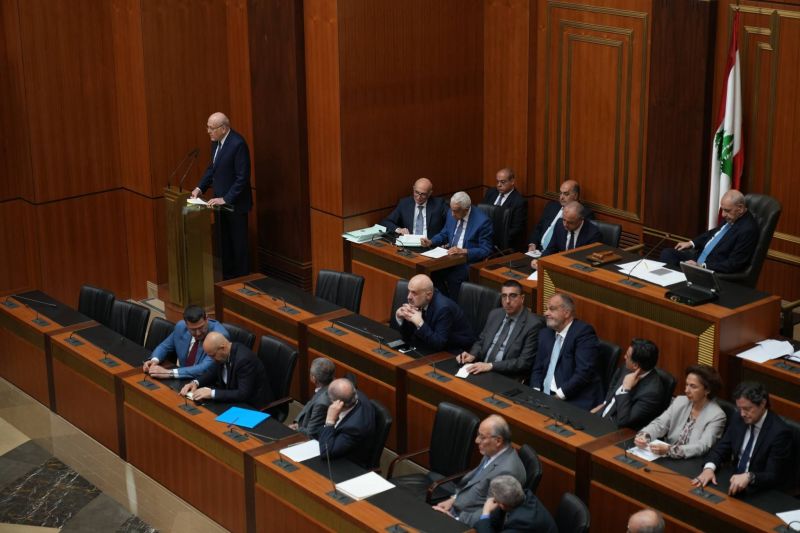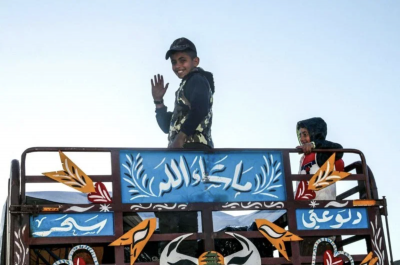
The outgoing Lebanese Prime Minister Nagib Mikati, addressing Parliament on May 15, 2024. Photo Mohammad Yassine / L'Orient-le Jour
BEIRUT – The Lebanese Parliament convened on Wednesday to address the $1 billion donation from the European Commission and the status of Syrian migrants and refugees. Parliament agreed on key recommendations, including the formation of a ministerial committee led by the Prime Minister to devise a plan for refugee return, urging international support for bolstering border security and facilitating refugee repatriation.
The $1 billion aid package was announced by European Commission President Ursula von der Leyen during her visit to Lebanon on May 2.
"The EU's announcement received significant criticism – especially from Christian parties – accusing the EU of attempting to "bribe" Lebanese authorities into keeping Syrians in Lebanon so as to prevent their migration to Europe. The parliamentary session was planned with the aim of unifying Lebanon's approach, particularly ahead of the Brussels summit on Syria scheduled for May 27.
During the session, outgoing Prime Minister Najib Mikati outlined his administration's policies regarding Syrians in Lebanon, leading the discussion toward producing a legislative recommendation, reinforcing existing laws to address the migration crisis and calling for an agreement with Damascus.
Context of the Session
Politicians of all stripes regularly call for the repatriation and deportation of Syrians, of which there are an estimated 1.5 million who fled to Lebanon as refugees from the war in Syria, which continues to ravage parts of the country more than a decade later. Lebanese authorities claim that security conditions allow for such a return, while the United Nations and human rights groups warn that this is not the case.
Of all Syrians in Lebanon, around 800,000 are officially registered as "refugees" with the UN High Commissioner for Refugees (UNHCR), which stopped registering refugees in 2015, at the Lebanese government's request.
The issue resurfaced in April after the kidnapping and murder of Pascal Sleiman, a local Lebanese Forces (LF) official, which the army alleges was committed by a gang from Syria.
It was against this backdrop that Ursula von der Leyen visited Beirut in early May to announce a $1 billion donation aimed at "reviving the economy" and launching several projects, including border protection. Von der Leyen's visit coincided with that of Cypriot President Nikos Christodoulidis, whose country has repeatedly warned of an influx of migrant making the perilous journey across the Mediterranean from Lebanon.
Recommendations
During the session, Parliament decided to:
- Form a ministerial committee, headed by the Prime Minister, that includes the Ministers of Defence, Interior, Displaced Persons, Social Affairs, as well as the Army Command, Public Security, Internal Security, and State Security. The committee will devise a detailed plan for the return of refugees.
- Commit to implementing the applicable laws that regulate the process of entry into, residence in, and exit from Lebanon.
- Carry out the necessary legal procedures to hand over displaced prisoners to the Syrian authorities in accordance with applicable laws and procedures.
- Urge international partners and donors to support the government in bolstering military and security capacities for border control. Coordinate with Syria to regulate movement across legal crossings, enhancing security and limiting unauthorized entries and exits.
- Place a request at all United Nations agencies, especially the UNHCR, and international and European donor agencies, to approve the payment of incentives and financial and humanitarian assistance to encourage the return of the displaced to their country, through the Lebanese state and its institutions, or with its approval.
Key Statements from the Session
• House Speaker Nabih Berri stated that the "fate of Lebanon" is at stake in this meeting.
• Mikati emphasized that the European aid announced by von der Leyen "is just a confirmation of the periodic aid the Commission has been providing to Lebanon for years," and it will be "reassessed every six months." Von der Leyen promised to increase the amount and make European investments in Lebanon once the necessary reform laws are adopted, without any preconditions or agreements with the EU.
• Hadi Aboulhosn (Progressive Socialist Party): The government should coordinate with the Syrian regime to ensure border control and identify safe zones for voluntary returns. He opposed opening the sea to migrants as suggested by Hassan Nasrallah and emphasized distinguishing between different categories of Syrians in Lebanon.
• Melhem Khalaf (Independent, formerly Change bloc): "If we want to be serious about addressing, confronting, and saving the remaining hopes of our people, we must restore a capable and just state and restore the organization of its institutions, and the entrance to that is the election of a president." Parliamentary sessions "should continue without interruption until the next president is elected."
• Jihad Samad (Independent, pro-Syria): The real solution lies in "lifting the siege" on the Syrian regime. While there's consensus that Syrian refugees are a burden on Lebanon's economy, security, and demographics, there's no unanimity on how to address the issue.
• Gebran Bassil (Free Patriotic Movement): Any displaced person can return [to Syria], unless they are displaced for political or security reasons. The case must be handled between Lebanon and Syria. Procedures taken in Lebanon must be based on Lebanese law and on the principle of the human dignity of Syrians.
• Georges Adwan (Lebanese Forces): So far, we are not applying the principle of national sovereignty, either internally or in terms of foreign relations. We must exercise our sovereignty, whether in our relations with Syria or with Europe and the United States. The deportation of illegal Syrians to their country must be based on the principle of sovereignty.
• Samy Gemyael (leader of Kataeb Party): Asked whether the EU deal “stipulates that the return of illegal refugees from Europe will be to Lebanon or the country of origin?"
“The political team controlling the Lebanese state,” referring to Hezbollah, “does not want to solve the displacement crisis, so [refugees] remain a blackmail card used to lift the siege on Syria."
• Hussein Al-Hajj Hassan (Hezbollah): “We should not ignore the basic causes of displacement,” demanding “not to prevent the displaced from migrating across the sea, and we hope to avoid racism in dealing with the file.”
• Walid Al-Baarini (Future Movement, Akkar): “We support the recommendations proposed yesterday regarding the Syrian displacement file, and we hope for cooperation from the Lebanese state regarding the people from Akkar who are being tried in Cyprus.”
